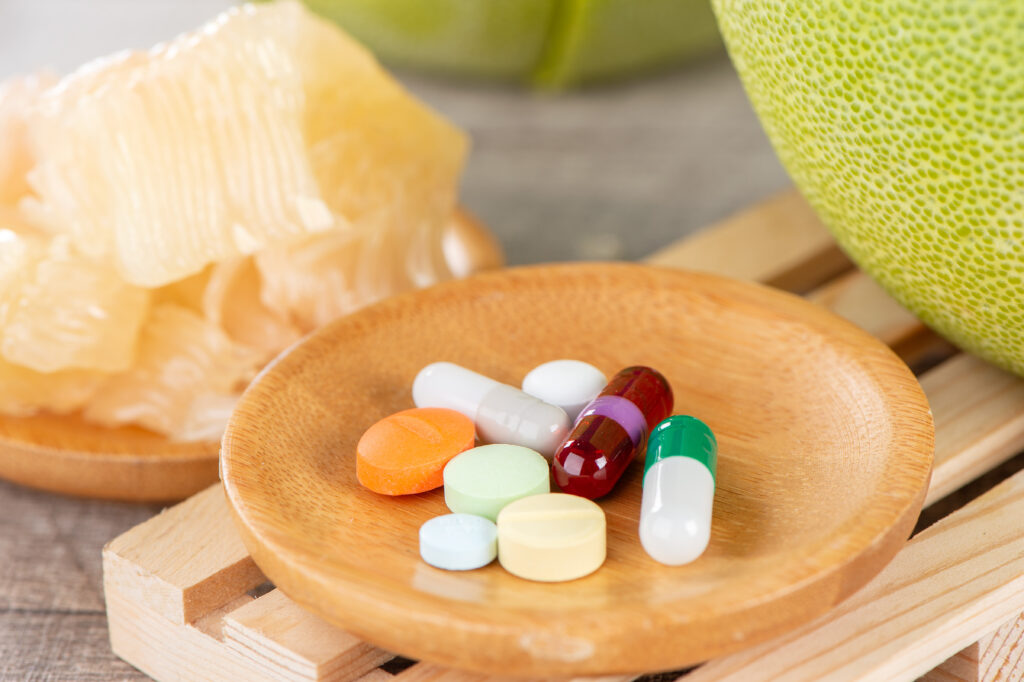
If you read our recent blog, then you’re aware of the harmful drug interactions that can occur if you take certain medications together. But did you know that food can interact with your medications, as well?
What you eat, and when, may affect how much of a medication you absorb, how well it works, or how severe its side effects may be. For example:
- Some medications need to be taken with food, either to prevent side effects like nausea and diarrhea, or to improve absorption. “Fat-soluble” drugs, for example, are absorbed better when taken with a meal that has some fat in it.
- Some need to be taken on an empty stomach. These drugs need an acidic environment to help them dissolve properly, and the stomach is more acidic when it’s empty, rather than when its acids are working on digesting food.
- Some drugs interact with specific foods, which can affect their “bioavailability”— that is, how much of the drug is able to enter your system and do what you hoped it would do.
Here are some specific examples:
Food-drug interactions — a few examples
- Dairy and doxycycline: doxycycline, a type of antibiotic, is an effective treatment for acne, bladder infections and other infections. However, dairy products and other foods high in calcium and iron interfere with your body’s ability to absorb it, allowing too little to get into your bloodstream and reducing the medication’s effectiveness. For best results, avoid these foods within two hours of taking doxycycline.
- Grapefruit and statins: with certain cholesterol-lowering medications — specifically, simvastatin, atorvastatin and lovastatin — grapefruit and grapefruit juice allow too much of the statin into the bloodstream. This can increase side effects such as muscle aches and pain. Grapefruit affects many other drugs, as well, so it’s a good idea to check with your pharmacist before enjoying this citrus with your medications.
- Leafy greens and warfarin: when taking warfarin, it’s very important to stay consistent with the amount of vitamin K you eat. An increase in dietary vitamin K, which helps your blood clot, can act against warfarin, rendering the blood thinner less effective and increasing the risk of a life-threatening clot. That doesn’t mean you have to stop eating foods that are rich in vitamin K — dark green, leafy vegetables such as kale, broccoli and spinach are highly nutritious and provide many important benefits. Just make sure to eat about the same amount of them every day to stay in balance with your prescribed dosage of warfarin.
- Food and levothyroxine: about 70-80% of this thyroid medication is absorbed through the intestinal tract, and the addition of food can interfere with that absorption. Ideally, to make sure your dosage is effective, take it in the morning at least 30-60 minutes before breakfast.
How to avoid other food-drug interactions
If you see a food warning on your medication label — such as, “Take with food,” “Take on an empty stomach,” or “Do not take with grapefruit” — follow these instructions. That’s really important. Disregarding them can cause too much or too little of your medication to enter your bloodstream. With some drugs, absorbing too much can act like a higher dose and cause more severe reactions, while too little can render the medication ineffective.
Don’t see a warning label? Not every potential food interaction is spelled out on the package. Before taking any new medication, ask your health care provider or pharmacist about potential food-drug interactions. Don’t rely on the internet alone for advice about something this important. Stick with trusted professionals. Your local pharmacists are some of the most accessible health care professionals on your team and are always happy to answer your questions.
This is Part 2 in our pharmacy series on drug interactions. If you missed Part 1, read it here: Taking several meds or supplements? Beware of drug interactions.


